Libaas Now got in touch with Aiza, a young entrepreneur, to talk about her online brand, The Saari Girl; how she goes about her business, the challenges she has had to face considering the Saari wasn’t (and maybe in some ways, still isn’t) acceptable in our society and what all kinds of Saari she has to offer.
Kaynat: Tell us about your brand and how you came up with it?
Aiza: The brand came out because I was personally looking for a casual Saari for myself for our Senior Year Dinner but I couldn’t find any. The idea stayed with me. I’m not a fashion student, I’m an anthropologist interested in social constructs. I wanted to see where the Saari had gone and why couldn’t I find something that didn’t burn a hole in my pocket and one I didn’t want to wear to a wedding but could be worn casually.
So with these thoughts in mind, I started my brand. I normalised the idea of Saari in the everyday mainstream. It started off with my own personal passion of wearing a Saari to an event in which it’s not really common to see a person in a Saari.
The business started off in 2019. As a result, initially I would just post on Facebook. People would contact me to buy Saari but then I wanted to create a personal & public divide so eventually I was talking to my friends, bounced one idea to another. I came up with “The Saari Girl” and my best friend designed the logo. It was supposed to be a side business thing for when I had time on my hands but Alhamdulillah, it’s grown to be what it is today!
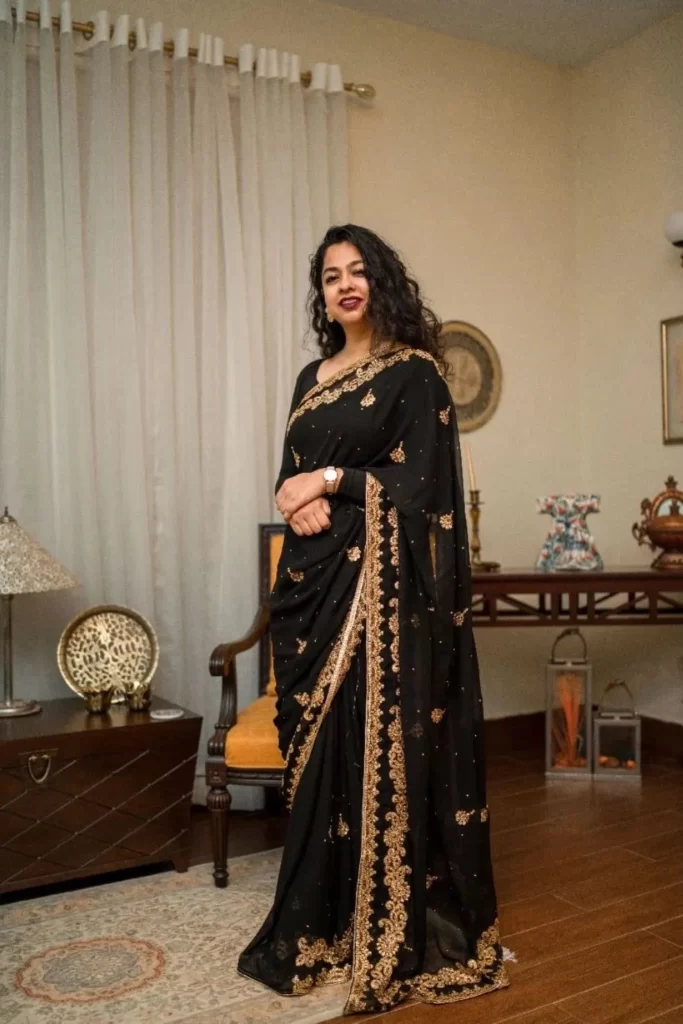
We got in touch with Aiza, a young entrepreneur, to talk about her online brand, The Saari Girl; how she goes about her business, the challenges she has had to face considering the Saari wasn’t (and maybe in some ways, still isn’t) acceptable in our society and what all kinds of Saari she has to offer.
Kaynat: Tell us about your brand and how you came up with it?
Aiza: The brand came out because I was personally looking for a casual Saari for myself for our Senior Year Dinner but I couldn’t find any. The idea stayed with me. I’m not a fashion student, I’m an anthropologist interested in social constructs. I wanted to see where the Saari had gone and why couldn’t I find something that didn’t burn a hole in my pocket and one I didn’t want to wear to a wedding but could be worn casually.
So with these thoughts in mind, I started my brand. I normalised the idea of Saari in the everyday mainstream. It started off with my own personal passion of wearing a Saari to an event in which it’s not really common to see a person in a Saari. The business started off in 2019. As a result, initially I would just post on Facebook.
People would contact me to buy Saari but then I wanted to create a personal & public divide so eventually I was talking to my friends, bounced one idea to another. I came up with “The Saari Girl” and my best friend designed the logo. It was supposed to be a side business thing for when I had time on my hands but Alhamdulillah, it’s grown to be what it is today!
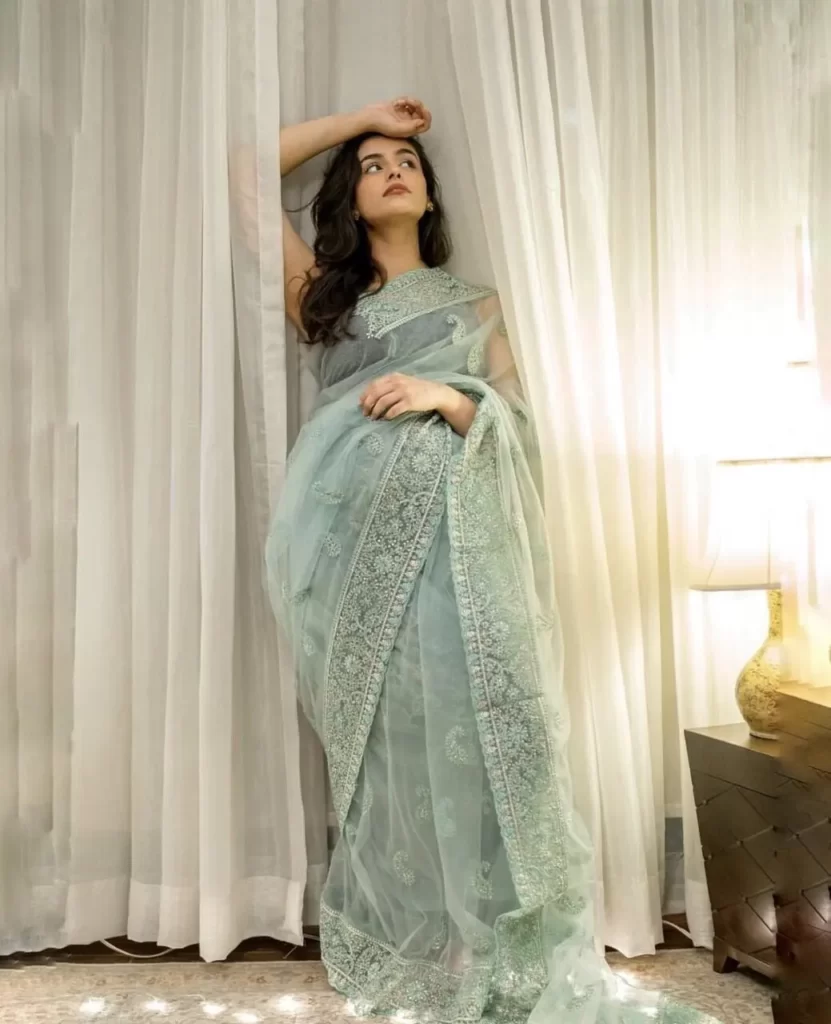
Kaynat: What challenges did you face?
Aiza: Initially, when I started off, it was just me doing it alone and while that was very empowering for me, I learnt a lot of things. What I learned most was how there are a lot of stereotypes attached to this dress, there are a lot of body issues that exist while wearing this particular dress form, some ideologies attached to it are ridiculous.
So just to sit down with people, as they would reach out to me and vent in my DMs about how they want to wear a Saari but their mothers don’t allow it or their saas or husband think it’s inappropriate, that their body is not flattering enough, these kind of issues people would talk about left a very personal impact on me.
On a personal level, just listening to people’s inner turmoil and societal restrictions with the Saari, trying to battle those together, has been challenging and it’s an ongoing challenge but I think we are getting to places. People are messaging us and telling us that our campaigns have helped them boost their confidence and feel better about themselves.
In terms of other challenges, it’s been difficult dealing with courier companies, vendors, just the way business dealings function here in this country. A lot of people here aren’t very honest and you get thrown off from time to time. But with determination and willpower you do power through.
Lastly, for me it was very difficult for me to bridge a personal and work life balance because this is something I’m very passionate about so I would be doing this 24/7, especially during COVID and that really exhausted me but eventually I learned how to balance that as well.
K: Who designs your Saari?
A: We have a number of different types of Saari. We have designs that are made locally and since Pakistan is a diverse country, there’s different regions involved.
We mostly work with people in Punjab and Sindh so the kind of handicraft and techniques that are followed here, local artisans and their work, we work with those.
We also work with artists across the border so embroidery techniques or printing techniques that are more common to countries like India, Sri Lanka, countries where Saari is more common, there are more designs that are available so we also work with those patterns and techniques for our Saari.
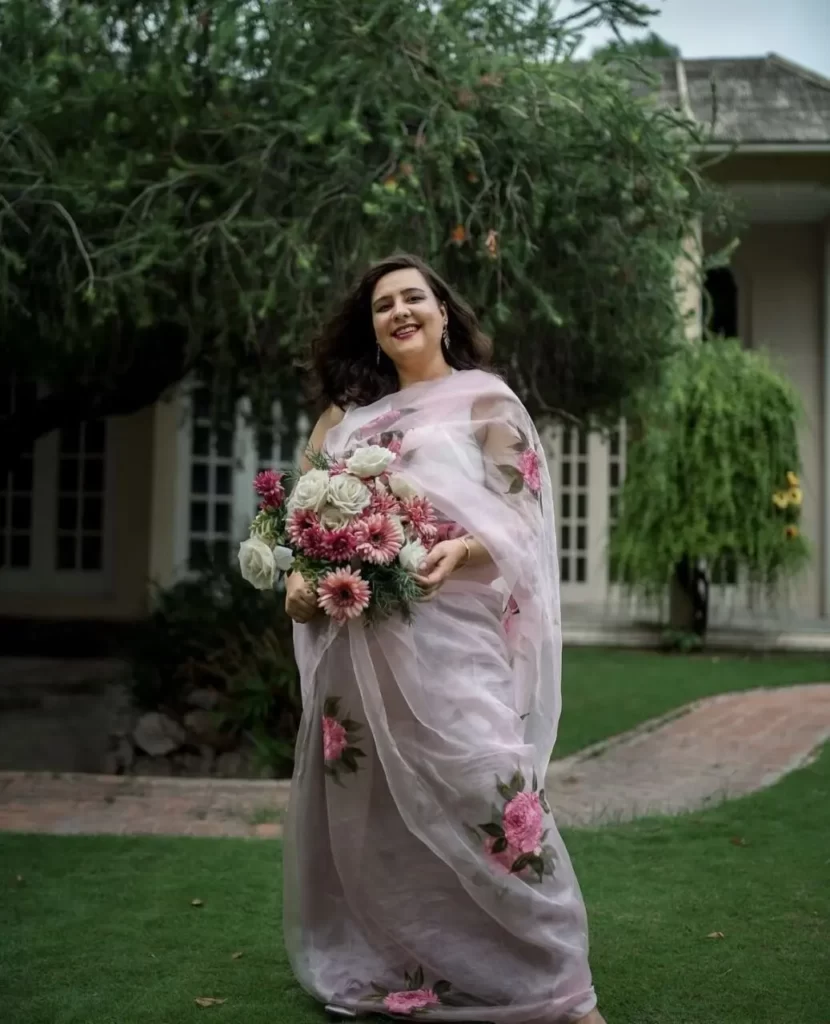
K: Where do you find inspiration for your Saari?
A: For me personally, it’s about owning our heritage, owning what is South Asian culture and presenting that as honestly, as much in a raw form as possible. I don’t like to impose my own decisions, I sit down with vendors and see what they have to offer and then I kind of play around with it.
For instance, if it’s something that is an age old technique, I see if maybe there are dupattas being made with this technique so then I try to incorporate that technique on a Saari. Basically, my inspiration comes from a number of places that mainly have to do with the rich work that artisans offer with their own skills.
K: What different types of Saari do you offer?
A: There are over 300+ Saaris on the website currently. We have net Saari with different kinds of nets like embroidered net, solids, edged net and soft pastel shades, some are sequins and bold nets as well.
We have Banarsi Saari, Ombré Silk, Cotton, Cotton Silk, Ajrak, Hand Blocked, Lace, Chiffon, Georgette, Digital Printed, Hand Painted Saari, and the list goes on. I try to bring to the table as many Saaris as possible. We’ve recently launched Velvet Saari as well.

K: What price range does your Saari fall in?
A: The price starts from Rs.4500 onwards and the maximum price is Rs.16,500. Our aim is to make Saari accessible for most people and not let the price be the deciding factor in this case.
K: In what ways can your Saari be draped?
A: I would say that a Saari is 60 yards of a loose cloth that you can drape in a hundred different ways, depending on the number of pleats you want, how you want your pallu, how you want your fall to be.
There’s so much you can do with a loose piece of cloth. I will take a step back and say, it’s not just my Saari that can be draped in many different ways but the Saari as a dress is very versatile and something that you can style in many ways and that’s the beauty of it.
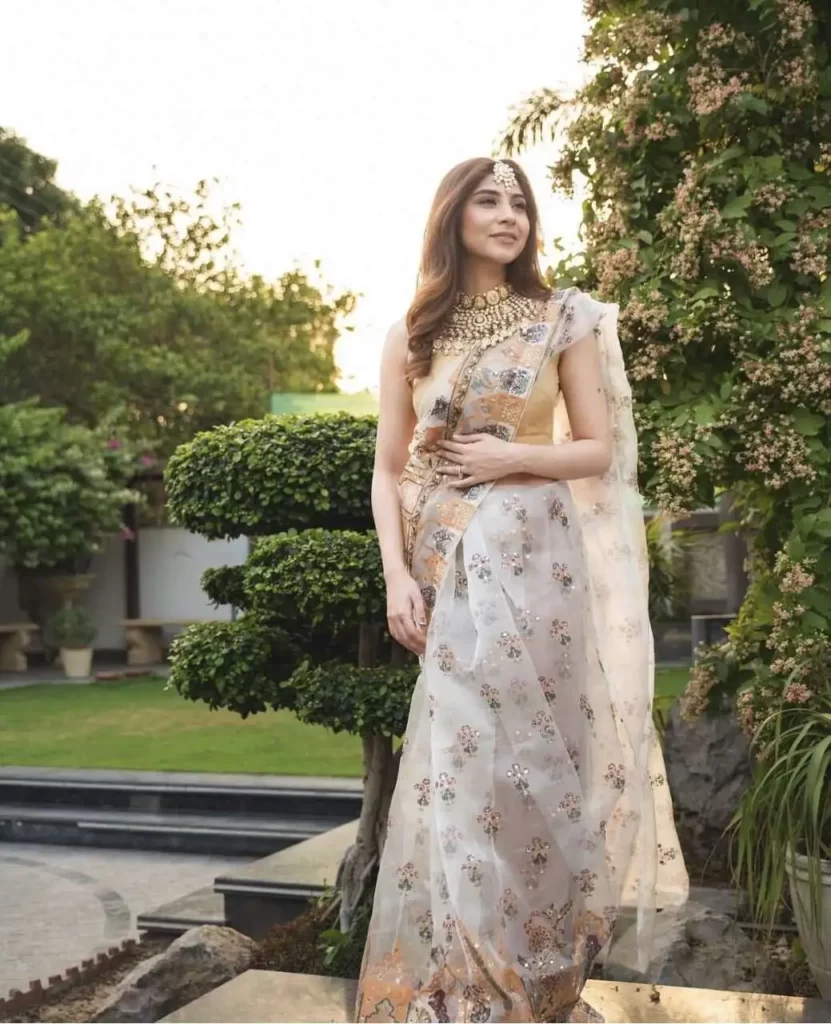
K: How fast did your business grow?
A: My business is still home based and I’m still running it in a very personal capacity so I would say I just pooled in my time and effort into it and that’s worn its results. I don’t think I can really attach a timeline to it but if you want, I started it off in December, 2019 and as of now, we’re about 98k followers strong.
K: What have you learnt along the way? How has your journey been?
A: Patience and effort can take you a long way. Forming interactions, appraising people, taking them along with you; be they customers or team members, that is the beauty of any kind of professional, or even personal, setup anywhere. So that’s something I do and I think is the most important factor for me in any dealing that I do.
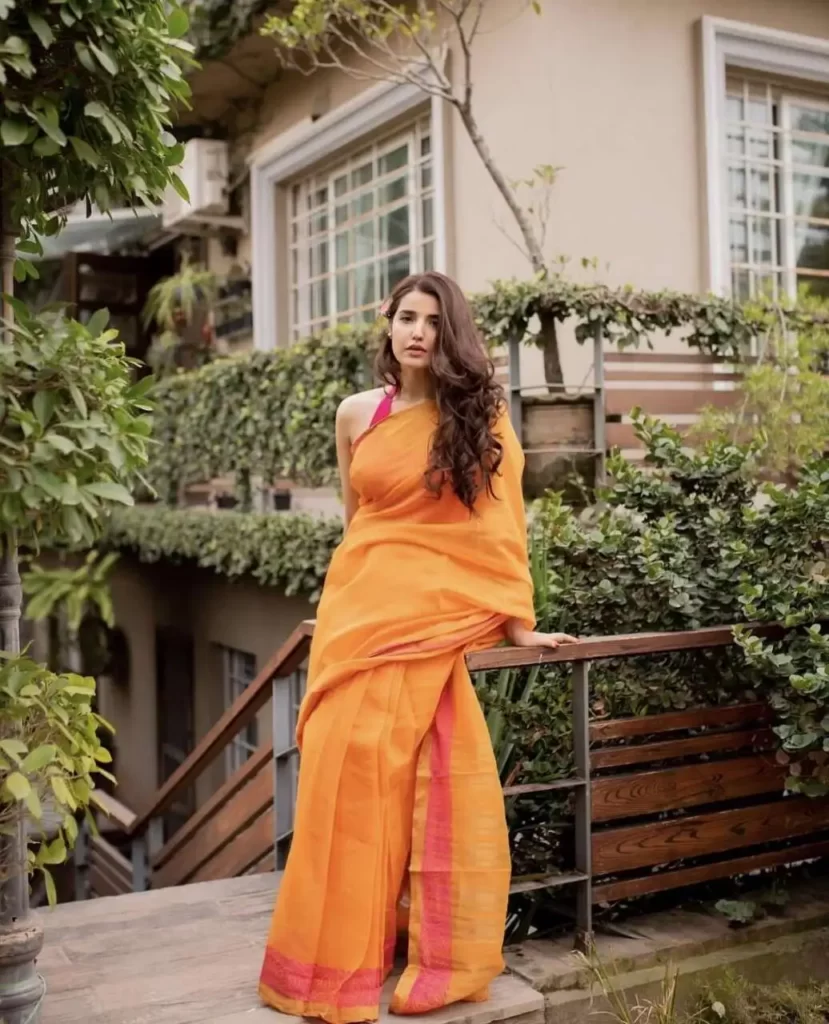
K: Do you plan on expanding?
A: Yes, we do plan on expanding. In fact, we’re working on that currently. We’re still a small team, an all women team, and we’re working on new ideas so we’re always planning on launching new designs, coming up with new campaigns.
Lately we’ve also been doing pop up exhibits so that people can check out our stuff in person. We’ve also launched a home based studio so you can book an appointment and come visit us. Expansion is ongoing step by step.
K: One advice for entrepreneurs?
A: I think one advice that I have for entrepreneurs generally, which is not just limited to fashion as I like to consider myself more as a social entrepreneur, that whatever you do, just make sure that you’re passionate about it. If it’s something that’s not coming from the inside, if it’s solely just about monetizing, that may work for some, but for me I believe that when you generally believe in doing what you love and putting in your best effort then that reaps fruit. So for anyone trying to purse anything for that matter, just follow your heart and give it your best shot!

